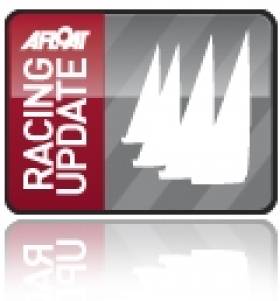Displaying items by tag: Ailsa Craig Race
Sigma 33 'Elandra' is Ailsa Craig Handicap Race Winner
At what proved to be the end of a three-week spell of light weather, Royal Ulster Yacht Club’s Rollins Insurance supported traditional offshore Ailsa Craig race started at 8 pm on Friday, 16th June.
The fleet of seven wound its way 40 miles north to the Craig off the coast of the Mull of Galloway and back to the finish line at the Club.
The diverse fleet ranged from Alan Hannon’s new French-designed JPK 1030 Coquine to the more modest Elandra, Vicky and Martin Dews’ Sigma 33.
And it was Elandra that managed to stay in touch with the bigger boats all night and finished as the sun set on Belfast Lough with the IMX38 Excession (O’Tiarnaigh, Mullholland and Harrington).
 Elandra (right) and Excession finish Ailsa Craig race. Photo courtesy RUYC via Facebook
Elandra (right) and Excession finish Ailsa Craig race. Photo courtesy RUYC via Facebook
On handicap, it was Elandra top and the distinctive Coquine second. The defending winner Gareth Martel’s Beneteau 40.7 Pippa VI was third. Three retired.
As boats in Class 1 finished within the 22.00 Time Limit, there was an extension of one hour for other boats in the class. It seemed that the wind delivered a cruel twist as the boats appeared to have been headed away from the finish as they crossed the Lough.
Results below
Martel's First 40.7 Pippa VI Wins Ailsa Craig Race
The light winds forecast for the Ailsa Craig Race from Royal Ulster on Belfast Lough on Friday night turned out to be at times 17 knots, which for Stuart Cranston’s Ker 32 Hijacker appeared just at the wrong time when the Bobstay on the bowsprit exploded. But for the eventual winner Gareth Martel in the First 40.7 Pippa VI things went rather more smoothly and he took line honours and the overall first prize.
The original four entries had risen to nine by the time of the start of the overnighter.
 The 60th Ailsa Craig start Photo: Bob Torrens
The 60th Ailsa Craig start Photo: Bob Torrens
Second overall was Michael Eames in the Sunfast 3200, All or Nothing from Strangford Lough Yacht Club with the Carrickfergus-based Corby 29 Elixir (Brian and Ryan Wilson) finished in third slot. Fourth was Russell McGovern of Sailschool NI in the Tripp 40, Infinity.
And despite Hijacker’s demise, it was a fifth for them. The question is now whether the damage and be fixed in time for the start of the Bangor Town Regatta on Wednesday next.
Royal Ulster’s Classic offshore overnight Ailsa Craig race will start from the club line at Bangor in Belfast Lough on Friday evening (17th) with the first warning signal at 19.00 hrs. On a good day, the Craig can be seen from the Club.
With a forecast of light winds, the course will probably be round the rock at the mouth of the Clyde and back to the club, about 80 miles.
At the moment there are four competitors, all of whom may be using it as a warm-up for the Bangor Town Regatta a week later, but given the unstable weather at present, some prospective entrants may be waiting until the last minute to make a decision.
On the other hand, they may be saving their energies for those four days of racing.
 Brian and Ryan Wilson's Corby 29, Elixir
Brian and Ryan Wilson's Corby 29, Elixir
Johnny Ritchie’s Dufour Classic 41, Mingulay from the host club, will join on the starting line, visitors Michael Eames in his Sunfast 3200 All or Nothing from Strangford Lough Yacht Club, Stuart Cranston’s Ker 32 Hijacker from Down Cruising Club, and Bryan and Ryan Wilson’s Corby 29 Elixir from across the Lough at Carrickfergus.
 Tyrena (Dr W E "Darty" Glover), winner of the first RUYC Ailsa Craig Race in 1962. She was a 39ft Charles A Nicholson design, built Berthon Boat Company of Lymington in 1959
Tyrena (Dr W E "Darty" Glover), winner of the first RUYC Ailsa Craig Race in 1962. She was a 39ft Charles A Nicholson design, built Berthon Boat Company of Lymington in 1959
Winner of the inaugural race in 1962 was the late Darty Glover in the 11-ton sloop, Tyrena and the late Dickie Brown of Portaferry was the winner the following year in the famous hard chine Black Soo, a van de Stadt design. Another memory is that of John Taylor who now lives in New Zealand, who recalls racing in the first race in what he describes as a “fair old southwesterly hammering in the channel”.
And the winner of the Fiftieth Anniversary event was Kenneth Halliwell’s She 31, She of the North. Many of those who had raced in 1962 turned out again for that event fifty years later. Among these was Darty Glover, then in his Eighties, who had travelled from Australia and John Taylor from New Zealand.
Ailsa Craig Race Celebrates 50th Anniversary
#RACING UPDATE - This summer the Royal Ulster Yacht Club will stage the 50th anniversary edition of the Ailsa Craig Race, one of the classics of the Northern Ireland offshore yacht racing calendar.
Many of the competitors from the inaugural race in 1962 - several of whom are now in their 80s - are expected to compete in the overnight challenge, which takes the fleet from Bangor to the rock at the mouth of the Clyde in Scotland.
The 2012 Ailsa Craig Race, sponsored by Hamilton Shipping, takes place on 15 June.






























































